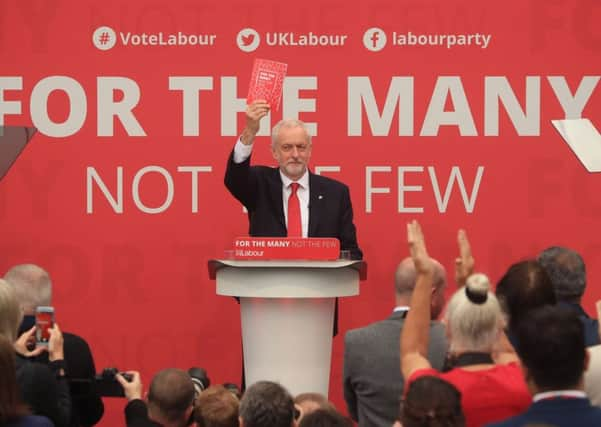YP Comment: Jeremy Corbyn and Labour's uphill struggle


It won’t be easy. Even the political editor of the Labour-supporting Daily Mirror noted at the launch that many of the party’s policy proposals, not least the renationalisation of the railways and utilities, were more popular than Mr Corbyn himself – a recurring theme since he became leader in 2015.
This is not to say that Labour’s ‘for the many, not the few’ mantra should be totally dismissed. Quite the opposite. Mr Corbyn’s sincerity and compassion is worthy of respect. Equally he has formulated a strategy which will strike a chord with those who do feel powerless and voiceless as the forces of globalisation that were already challenging the domestic economy before Brexit.
Advertisement
Hide AdAdvertisement
Hide AdHowever this support alone is not sufficient to win an election. Parties have to build coalitions of supporters across the spectrum and this programme of state control is not only a rejection of centrist politics but also a dismissal of New Labour’s winning formula under Tony Blair.
It also turns the economic argument on its head. Labour believe that the way forward is to impose swingeing taxes on the country’s top earners, hoping against hope that they don’t relocate overseas, while increasing corporation tax at a time when recent reductions have, in fact, generated extra revenue for HM Treasury. Labour still has a lot of explaining to do before the wider electorate will even consider its case.
Yet this launch also throws down the gauntlet to the Tories. Rather than trotting out the same old soundbites, it’s down to Theresa May to make a much more positive case for Conservative values with a set of galvanisng policies that are robustly costed. The still undecided are owed this at the very least.
Lessons in skills
NOW THAT the main parties are finally publishing their prospectuses for power four weeks after Theresa May called a snap election, here are two lessons that still need to be learned by the powers-that-be.
Advertisement
Hide AdAdvertisement
Hide AdSkills – academic, vocational, technical and digital – have never been more important and it therefore follows that teaching is a profession that needs to be cherished.
However this economic and social necessity is being compromised by a high turnover of teaching staff which is even more marked in those core subjects, like the sciences, maths and languages, which are so integral to a rounded education. One factor, according to the National Foundation for Educational Research, is because these teachers can secure better job prospects in other industries.
Pupils need continuity and consistency. They invariably excel when there’s a familiar face at the front of the classroom and less so when there’s a revolving door because teachers have either left, or are absent with ill-health. The recent rise in class sizes must also not go unchecked.
Young people only have one education. They can’t afford to be let down in such numbers so the question that each party leader is duty-bound to answer is this: what are you going to do to improve the recruitment, and retention, of teachers so all pupils are taught by the best?
The bank balance
Advertisement
Hide AdAdvertisement
Hide AdFIRST the good news. Enduring loyalty towards Yorkshire Bank, one of this region’s most trusted institutions, has seen its parent company record a 15 per cent rise in half-year profits.
Now the bad news. Despite recognition that not all customers are tech-savvy, further branch closures cannot be ruled out due to the digitalisation of banking.
Ominous words for those who value a personal banking service, not least its trustworthiness and security at a time when the issue of cyber security has never been more important, it’s further reason why the Government, and financial sector, should implement The Yorkshire Post’s call for tighter rules governing the closure of local branches.
When branches are shut down, some cashpoints are also being withdrawn making it harder for customers, and the less mobile in particular, to access their money. It’s quite simple – no closure should be sanctioned until alternative provision, guaranteed for five years minimum, is in place.